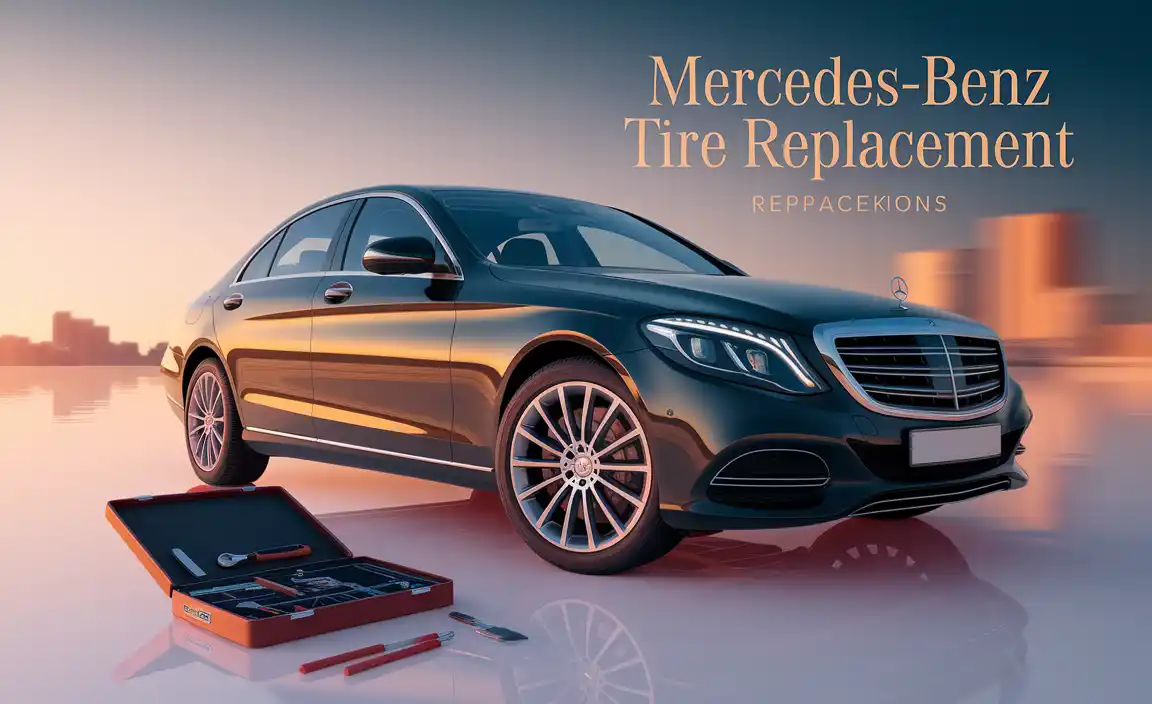Think of your tires like the shoes on your feet. You wouldn’t go running in worn-out flip-flops, right? Your Mercedes-Benz needs the right set of tires to move safely, grip the road, and stop when needed. This is not just about comfort. It’s about safety, control, and saving money in the long run.
Most drivers need a Mercedes-Benz tire replacement every 25,000 to 50,000 miles. But it depends on how and where you drive. Hot weather, bumpy roads, or hard braking can shorten that lifespan. That’s why regular tire service is key.
Whether you’re driving a sleek S63 AMG, a family-friendly GLS63 AMG, or a green Mercedes-Benz EQ electric vehicle, your tires play a huge role. They help with braking, turning, and handling bumps on the road. Simply put, your tires keep you connected to the pavement.
Signs It’s Time to Replace Your Tires
- Tread looks worn
- You feel vibrations
- Your car pulls to one side
- Cracks or bulges appear
Never Neglect Timely Tire Replacement
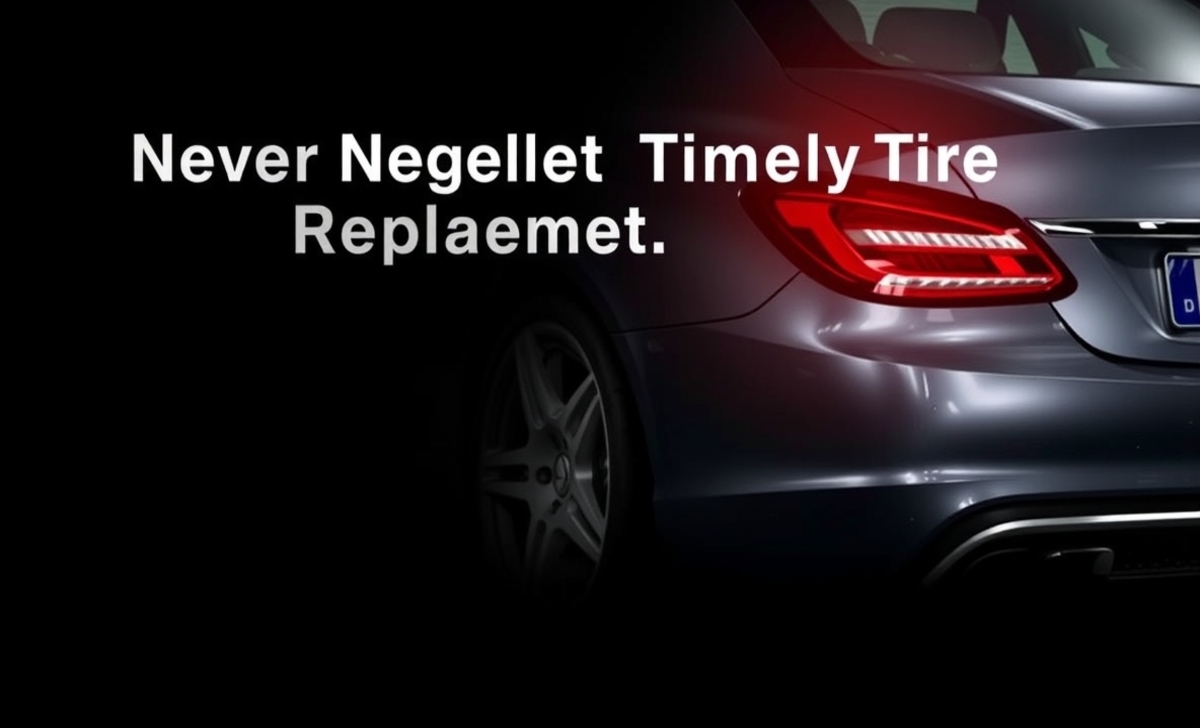
Tires don’t last forever. Even the best Mercedes-Benz original tires wear out. Heat, road debris, age, and everyday use all wear down the rubber. Your local Mercedes-Benz Tire Center checks for signs like low tread, cracks, or tire pressure issues. They help you replace old tires before they become unsafe.
Choosing The Right Tire: Why MO Tires Matter
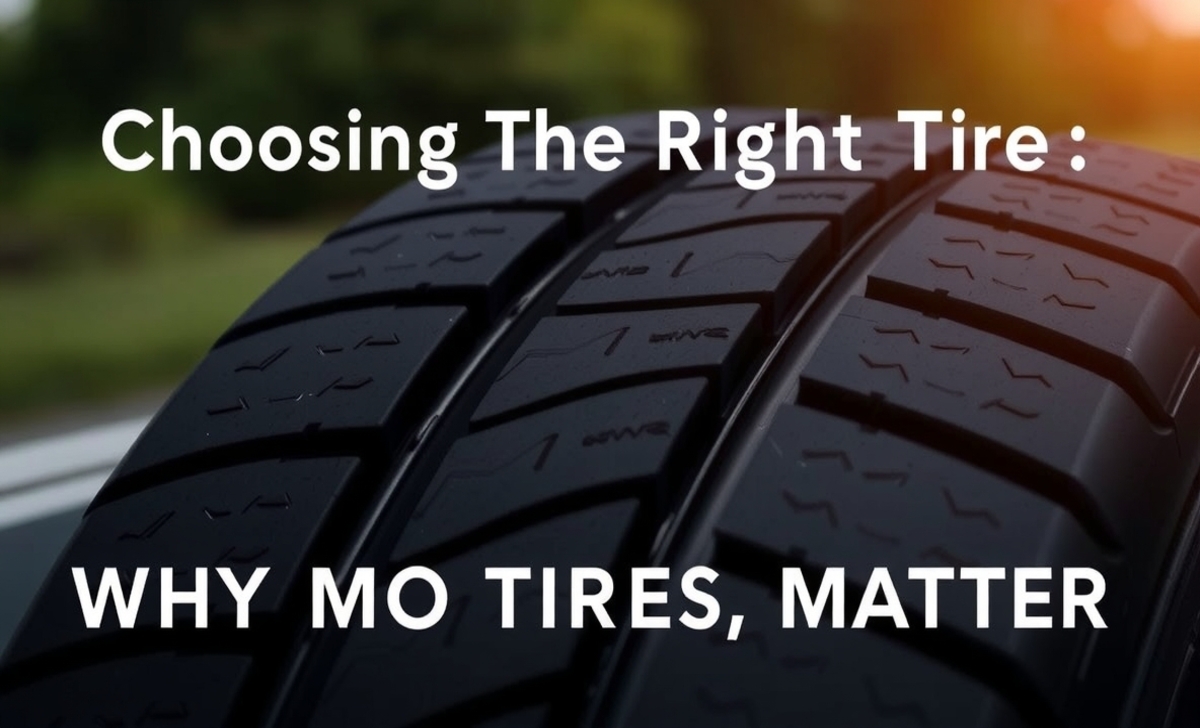
Mercedes-Benz vehicles are special. They need tires made for their weight, speed, and precision. That’s where MO (Mercedes Original) and MOE (Mercedes Original Extended) tires come in. MO tires are tested for your specific model. They’re designed for better grip, control, and braking.
MOE tires go a step further. They can run even after a flat, giving you time to reach help. And if you’ve got performance models like the GLS63 AMG or the SL63 AMG, you need tires that can handle the power. That’s where Mercedes Original Extended (MOE) tires come in. They let you drive even after a puncture. No drama, no towing.
These aren’t just any tires from a tire store. They are eligible tires with the right shape, rubber, and strength. Plus, sticking with eligible tires ensures you won’t void your Mercedes-Benz warranty.
Safety Benefits
Your tires are your first line of defense. Good traction means better control during sudden stops or in wet conditions. Mercedes-Benz tires go through strict tests to meet top safety standards. And those tests aren’t just fluff. I once dodged a deer thanks to tires that gripped like glue. You can’t put a price on that.
Performance Enhancement
Ever take a tight turn and feel your car hug the road? That’s your tires doing the work. Especially in a beast like the S63 AMG, where every inch of grip matters. Mercedes-Benz tire centers offer performance tires that elevate your driving experience. Faster stops. Smoother turns. No squeals. Just pure control.
Efficiency Improvement
Did you know your tires impact fuel economy? Yep, low resistance tires can save gas. Whether you drive a Mercedes-Benz EQ or a light truck, the right tire helps you go further with less. Well-maintained tires = better mileage and a smaller carbon footprint. Win-win.
Types Of Tires Suitable For Mercedes-Benz
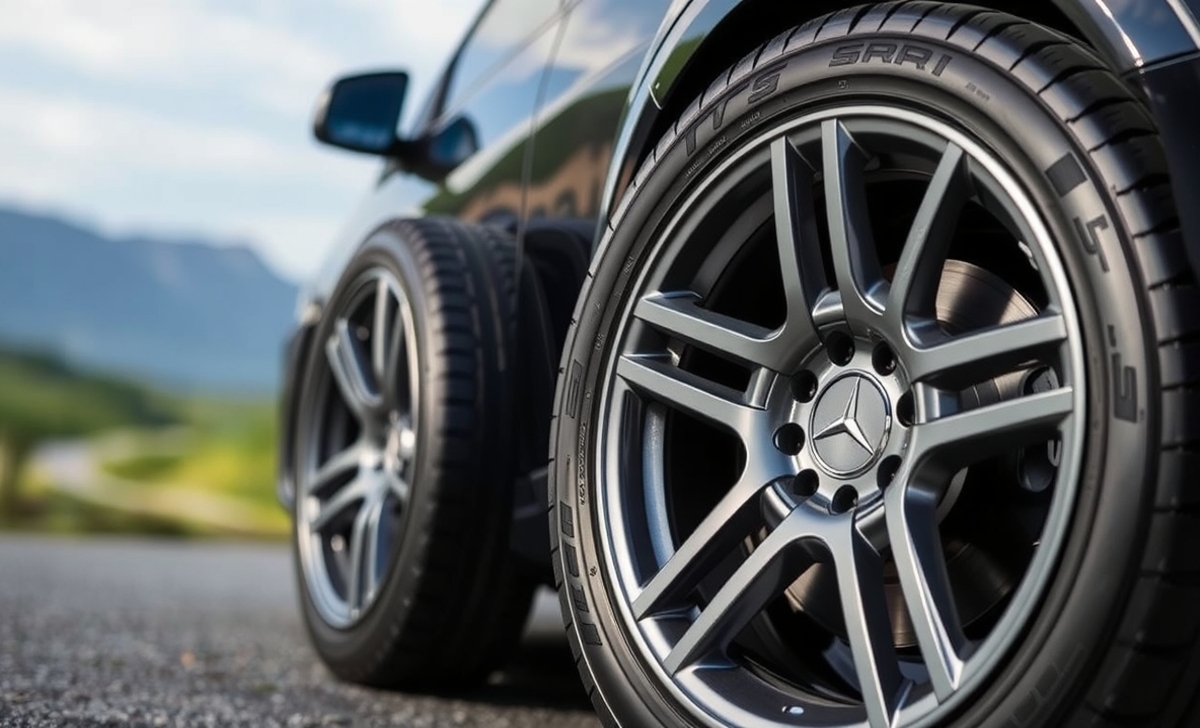
Your tires need to match your lifestyle, your roads, and your seasons.
- All-Season Tires
Great for year-round comfort and performance. Ideal if you live somewhere with mild weather.
- Summer Tires
Designed for dry roads and high speeds. A must for AMG owners who want max grip in warmer months.
- Winter Tires
Live in snow country? These are non-negotiable. They’re softer, grippier, and keep you safe when roads get icy.
- All-Terrain Tires
Perfect for adventurers and those with Mercedes Original vans or light trucks. Take on any terrain with confidence.
What Affects Tire Lifespan?
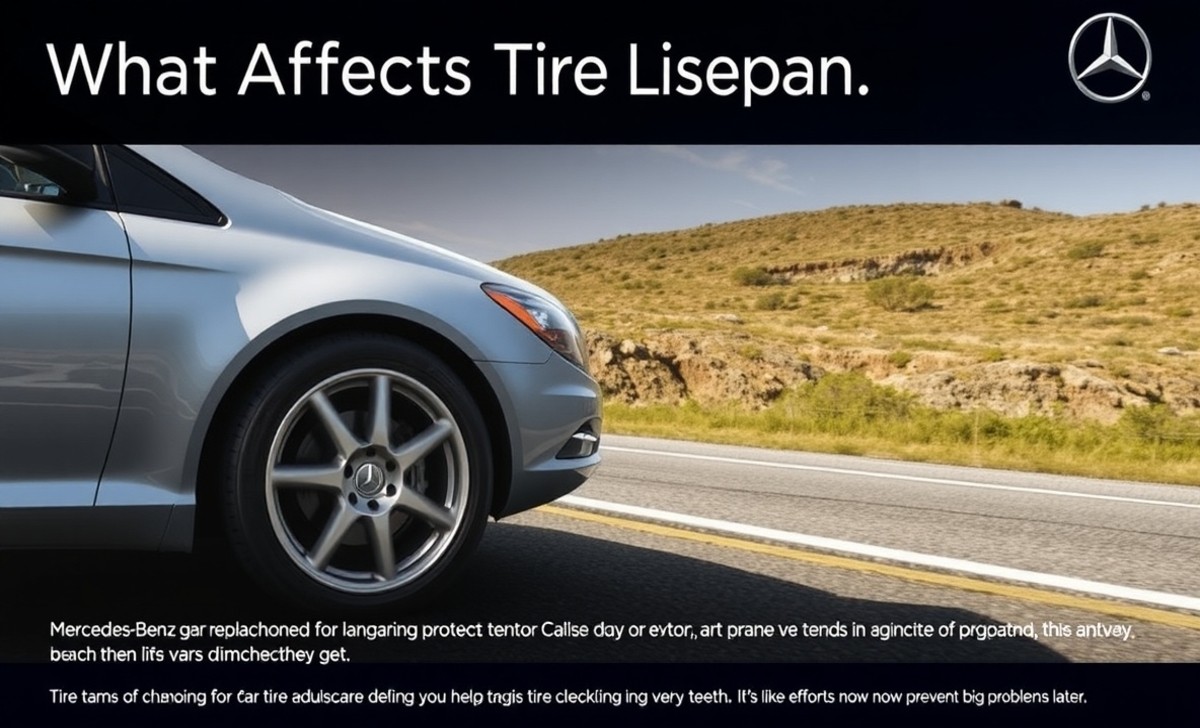
Your tires wear out based on:
- Mileage: The more you drive, the quicker they go.
- Roads: Rough roads wear tires faster.
- Speed and load: Heavy cars or fast driving increases wear.
- Tire pressure: Too high or too low damages tires.
Fun fact: Over 12% of car crashes involve tire issues. That’s why your Mercedes-Benz tire replacement isn’t just a service—it’s protection. Keeping the tire pressure right and checking for damage can help tires last longer. It’s like brushing your teeth. Small efforts now prevent big problems later.
How Often Should You Replace Mercedes Tires?
Experts suggest every 6 years or 50,000 miles, whichever comes first. But if you notice a damaged tire or loss of grip, don’t wait. Get it checked.
If your car pulls to one side or your tire pressure keeps dropping, you may need a tire replacement. Want an easy way to stay on track? Use the Mercedes-Benz app to schedule service. It reminds you when it’s time for a check-up.
How To Spot A Damaged Tire
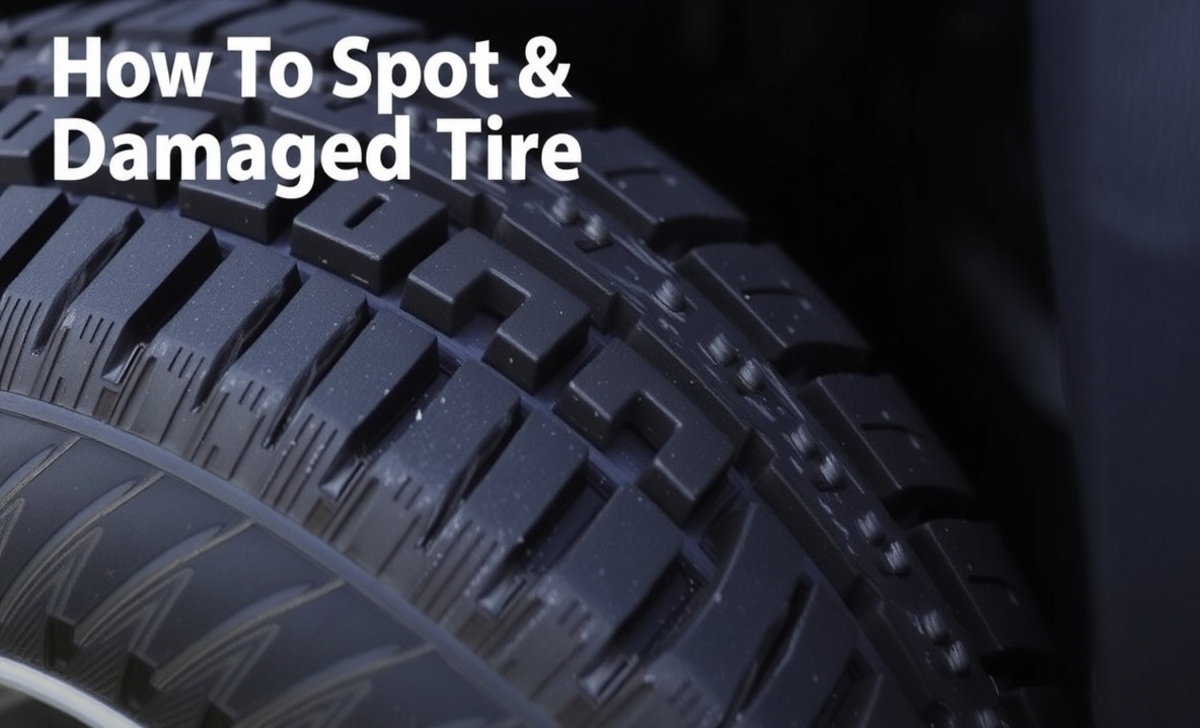
Tires speak — if you know how to listen.
Wobbling, thumping, or weird vibrations could mean a damaged tire. Check for bulges, deep cuts, or metal showing through. If you spot anything odd, visit a tire store or service center fast. Waiting can mean blowouts or worse. One check today can save a headache tomorrow.
Top Signs Your Tires Need Replacing
Think of your tires like the soles of your favorite shoes. Over time, they wear down, lose grip, and start to feel off. Same goes for your car. Regular Mercedes-Benz tire replacement is key to staying safe and keeping your ride smooth. From sidewall cracks to punctures, tires can take a beating. Especially if you hit a pothole or curb. Look out for:
- Bulges
- Uneven wear
- Nails or cuts
And if you’re ever in doubt, swing by a collision center or tire store. A worn tire isn’t just a nuisance — it’s a risk. It can affect braking, turning, and fuel efficiency. And nobody wants to get stuck with a flat tire in the middle of a road trip. Trust me, it’s happened to me once, and I’ve never skipped a tire service since. You don’t need to be a mechanic to spot bad tires. Here are clear signs:
- Worn tread: Try the penny test. If Lincoln’s head shows, you need new tires.
- Cracks or bulges: These mean your tire is weak and might pop.
- Low tire pressure: Frequent low pressure could mean damage.
- Strange sounds: A thumping or wobble can mean tire trouble.
- Pulling or shaking: If your steering wheel shakes, your tires may be uneven or damaged.
Ignoring these signs is risky. It’s like walking on ice with socks.
When And How To Rotate And Replace Your Tires
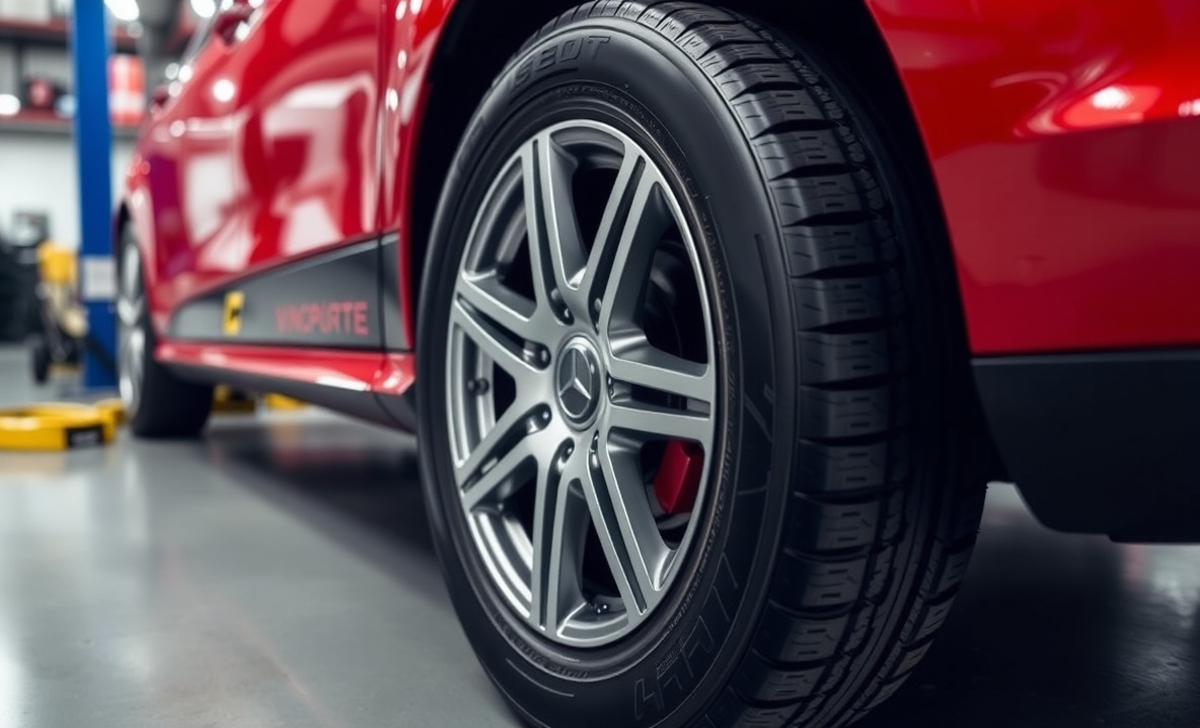
Rotate your tires every 6,000 to 8,000 miles. It keeps the wear even and your drive smoother. Use your Mercedes-Benz service center — they’ll know your vehicle and follow manufacturer specs. Don’t wait for a blowout. If you’re unsure, visit a tire center or use the shopping tools on the Mercedes website.
Tire Pressure Checks: Tiny Thing, Big Difference
Under-inflated tires wear faster. Over-inflated tires grip less. That’s why checking your tire pressure matters more than you think. Mercedes-Benz cars often show warnings if pressure drops.
Still, it’s good to check monthly, and before road trips.
Use a digital gauge or visit your tire center. Correct pressure boosts fuel economy, comfort, and safety. Remember, even light truck tires need TLC.
Checking And Maintaining Tire Pressure
Tire pressure isn’t just about ride comfort — it’s safety and efficiency too. Check monthly or before long trips. Most newer Benz models alert you when pressure dips.
- Low pressure = more fuel and faster wear.
- High pressure = less grip.
The Role Of Mounting And Balancing
Ever notice your steering wheel shake? That’s a sign your tires might be off-balance. Tire mounting and balancing ensure your new tires sit right and spin evenly. It’s a small thing that makes a big difference. At a Mercedes-Benz tire service, certified techs use high-tech tools to get it right. And trust me, you’ll feel it the moment you hit the road.
Where Should You Go For Tire Service?
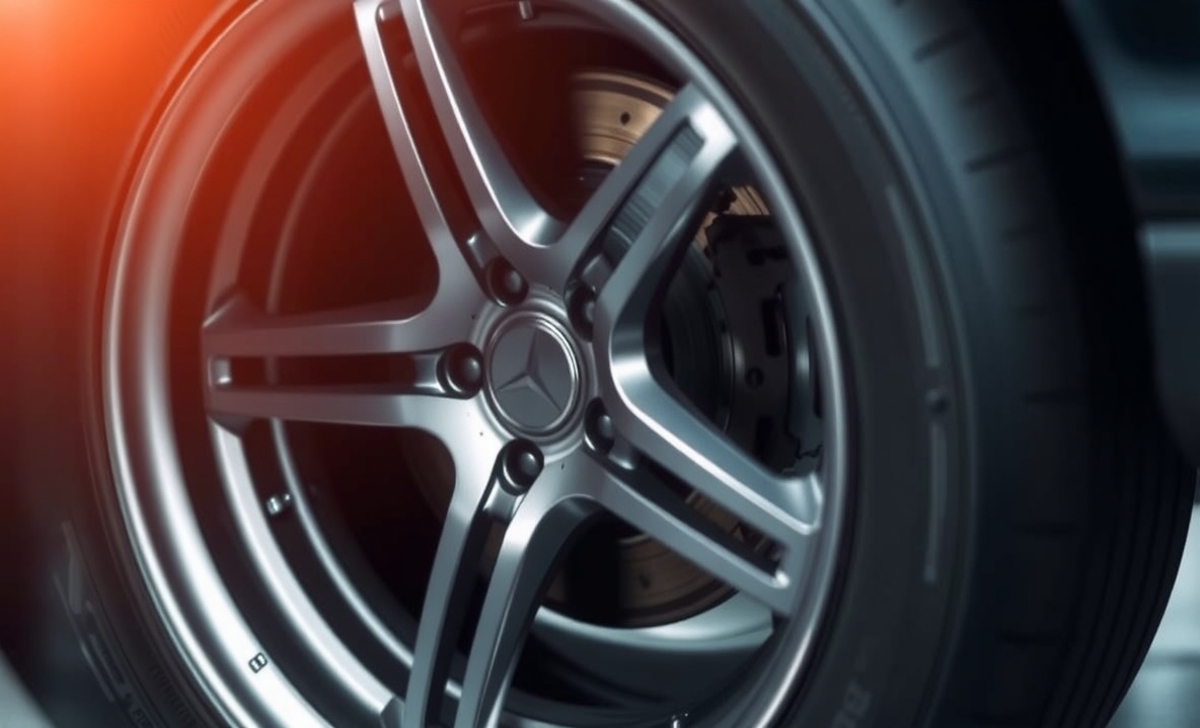
Sure, you could go to a regular shop. But with Mercedes-Benz, it pays to be picky. At an official Mercedes-Benz service center, you’ll find:
- Certified technicians who know your vehicle.
- Access to Mercedes-Benz tires, not aftermarket ones.
- Proper alignment tools.
- Warranty protection.
Your Mercedes-Benz tire service might even come with parts specials or road hazard coverage. These perks save you money if your tire gets damaged later.
Mercedes-Benz Tire Centers And Services
Use online shopping tools or ask your Mercedes-Benz service team. You’ll get expert advice and the exact fit for your ride.
Look out for service parts specials, new specials, and pre-owned vehicle specials. These can save you big. Want a deal? Check for Mercedes-Benz national offers or certified pre-owned specials — they often include new tires or discounts on tire installation.
Road Hazard Protection And Its Benefits
Life happens. Nails, broken glass, or potholes can ruin a good tire. That’s where road hazard coverage shines. It helps cover unexpected repairs or tire replacement. Ask your dealer or check the lease return process for details on tire conditions and protections.
Certified Professionals For Tire Installation
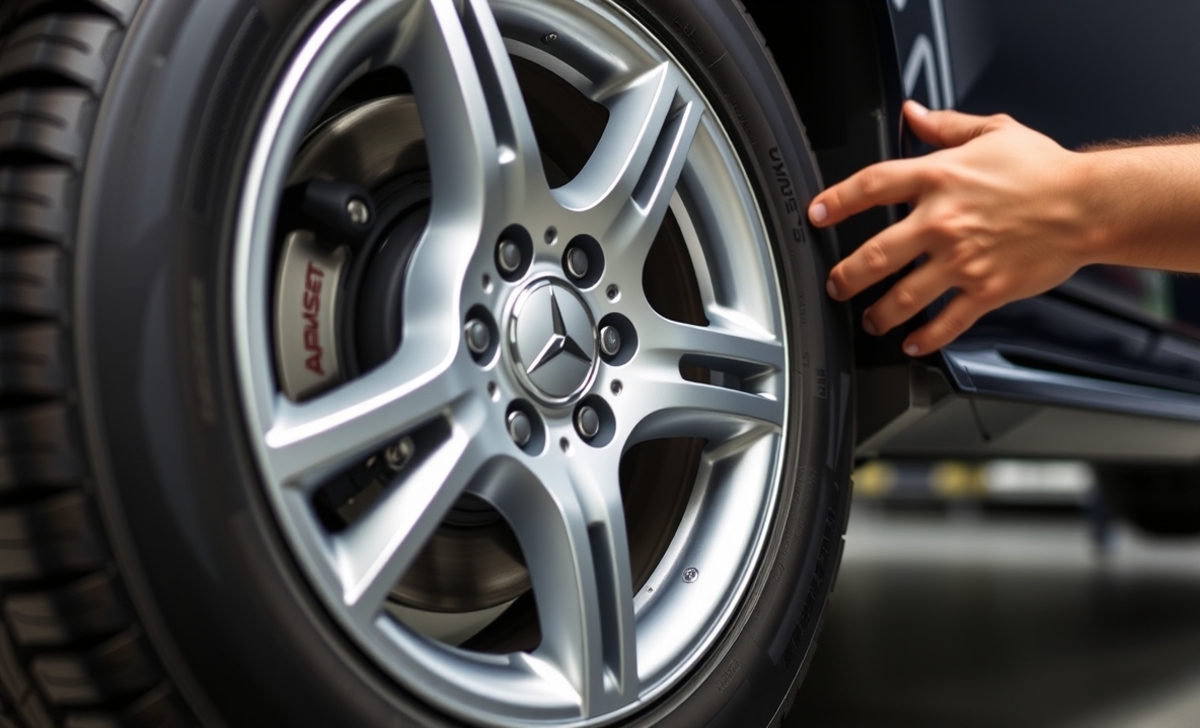
Tires aren’t just slapped on. Installation involves sensors, torque specs, and balance. That’s why you need certified professionals. At a Mercedes-Benz tire center, you get trained eyes and steady hands. Whether you’re dealing with retired courtesy vehicles, featured vehicles, or browsing new Mercedes-Benz inventory, expertise makes the difference.
Ensuring Optimal Performance
When your tires are chosen, mounted, and balanced right — you feel it. Quieter rides. Sharper handling. Smoother braking. This is where Mercedes-Benz service earns its name. It’s precision you can feel with every mile.
Maintaining Vehicle Safety
The smallest patch of rubber keeps you connected to the road. It’s wild, right? That’s why checking tire pressure, rotating regularly, and choosing MO tires is critical. Don’t gamble with safety — not when the solution is this simple.
Mercedes-Benz Tire Center Vs. General Tire Shops
A general shop might offer low prices. But cheaper isn’t always better. The Mercedes-Benz Tire Center gives you:
- The right tire for your model.
- Correct installation with care.
- Faster service and better guarantees.
- Access to new tires, retired courtesy vehicles, and service parts specials.
They also handle things like your flat tire, tire pressure monitoring, and lease return process. It’s like going to a tailor instead of buying off the rack. Your car deserves a perfect fit.
Roadside Assistance: Help When You Need It Most
Flat tire on the highway? It’s scary, right? But don’t panic. Mercedes-Benz offers roadside assistance 24/7. Just one call, and help arrives. A trained professional can replace your flat with a spare or tow your car. If your car uses MOE tires (Mercedes Original Extended), you might not need towing.
MOE tires let you drive short distances even after a puncture. This extra peace of mind means more freedom on the road. Mercedes-Benz drivers aren’t just driving — they’re driving smart.
The Role Of Road Hazard Coverage
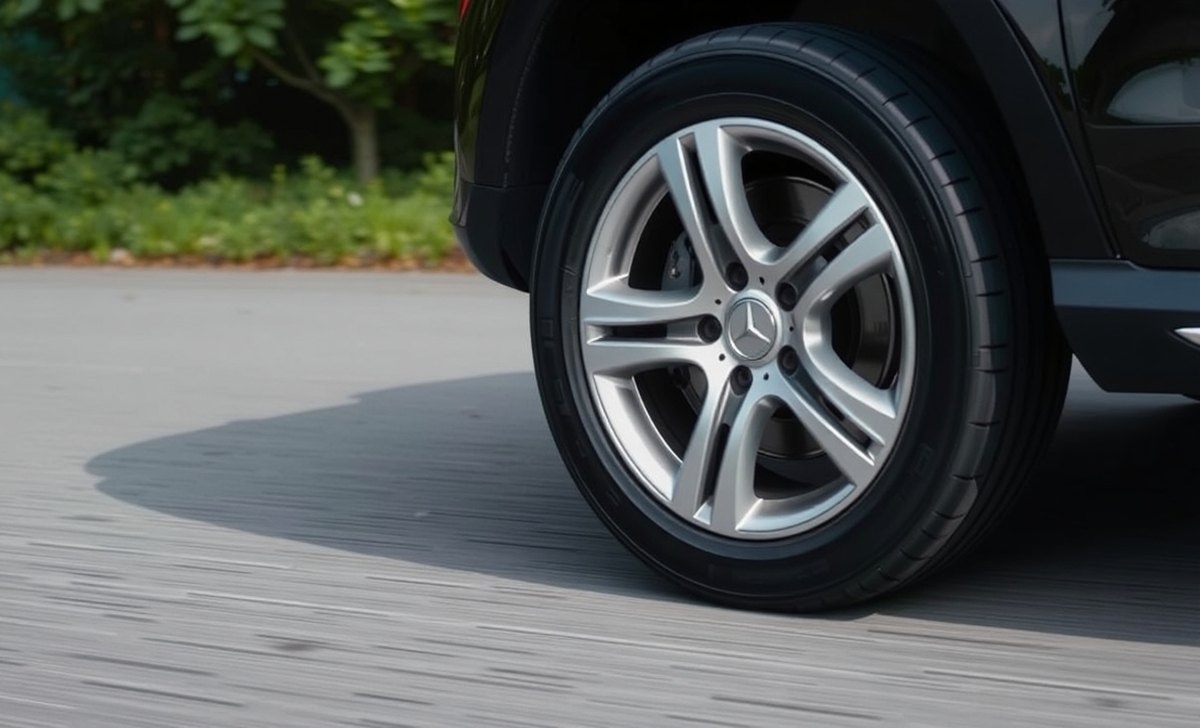
Tires can hit nails. Potholes. Sharp rocks. It’s life. Road hazard coverage helps when life gets rough. This protection plan helps cover repair or tire replacement costs. It saves you money on damage that’s out of your control. Ask your Mercedes-Benz tire center if your tires are eligible tires for coverage. It’s one small step for your wallet and one giant leap for tire safety.
Electric Vehicles Need Special Tire Care Too
Got a Mercedes-Benz EQ or other electric vehicle? You’ll want tires made just for EVs. EVs are heavier due to batteries. That weight needs strong, quiet tires. Tires for EVs also support instant torque and smooth rides.
The right tire improves range and handling. Some tires can even help with noise. Your Mercedes-Benz service center knows the best options. Let the pros help you stay efficient, smooth, and safe.
High-Performance Models? Extra Tire TLC Required

Own a GLS63 AMG, SL63 AMG, or S63 AMG? Then you know power means everything — and so do your tires. These fast rides need tires that grip tight and respond fast.
Mercedes-Benz tires for AMG models are specifically designed for high-speed performance. You may need more frequent tire service or tire replacement. But trust us, it’s worth it for that tight cornering and perfect control. Performance isn’t just under the hood. It’s under your feet.
Mercedes Original Tires Vs. Aftermarket Tires
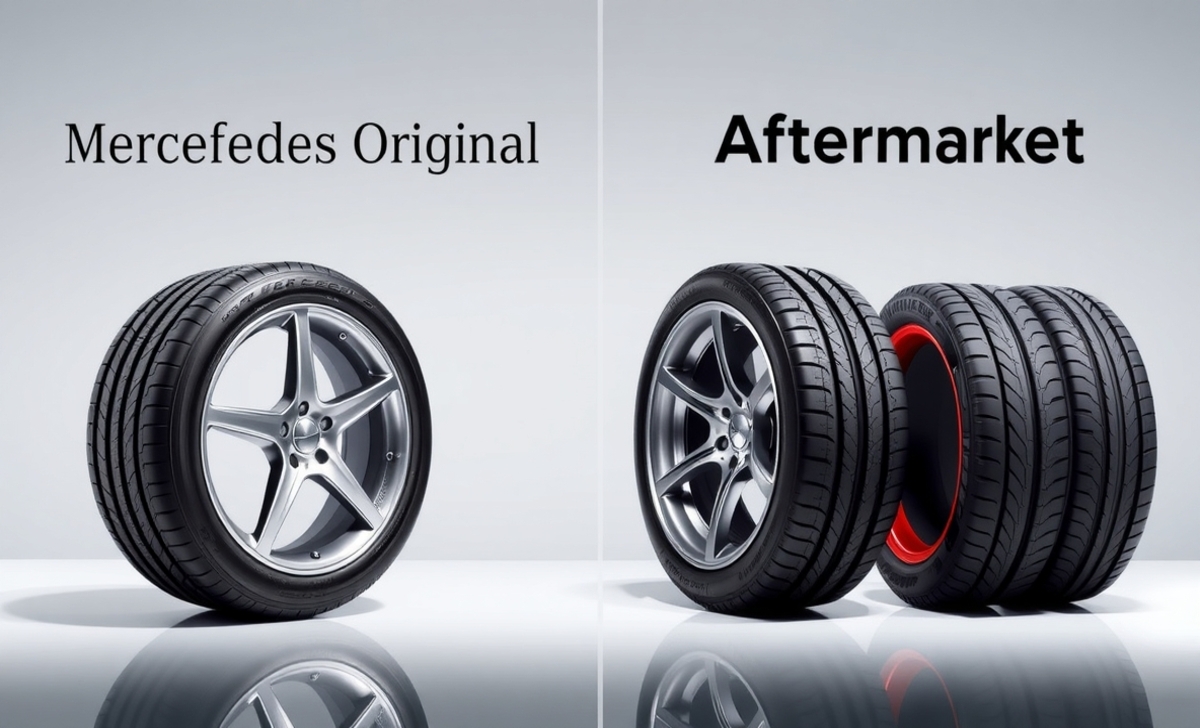
Here’s the big question: OEM or aftermarket? Mercedes Original Tires (MO tires) are made for your car. They’re tested for handling, quietness, and comfort.
They also protect your Mercedes-Benz warranty information. Aftermarket tires may seem cheaper, but they’re not always the right fit. You might lose performance or even risk safety. Always check with a certified technician or your service center. Your Mercedes deserves the best — don’t settle.
Convenient Shopping Tools For Mercedes Tires
Can’t visit the dealership today? No problem. Use shopping tools online to explore tires by model and year. Find options from brands like Michelin tires, all from your couch. You can even order parts or schedule tire service. Digital tools save time and help you make the right choice. Try exploring your new Mercedes-Benz inventory or certified pre owned vehicles too.
Leasing Or Returning A Mercedes? Tire Rules Apply
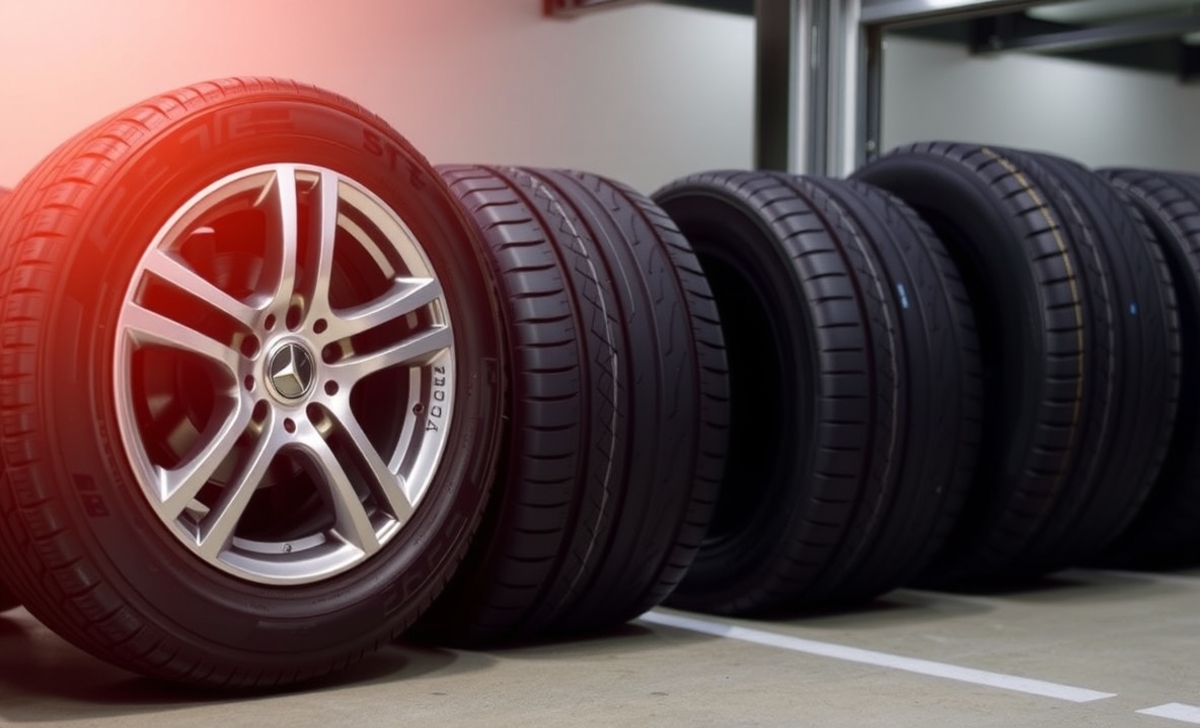
If you’re near your lease return process, check your tires. Mercedes-Benz expects tires to be in good condition. Tires must match in size and brand, especially for retired courtesy vehicles. Worn or mismatched tires may lead to extra fees. Need help? The Mercedes-Benz tire service team can guide you. They’ll make sure your lease return goes smoothly.
When returning your leased Mercedes-Benz, it’s essential to ensure your tires meet specific criteria to avoid additional charges. Here’s a summary of the key requirements:
Tire Requirements For Lease Return:
Tread Depth: All tires must have a minimum tread depth of 4/32 inches at the point of greatest wear.
Matching Tires:
Same Axle: Tires on the same axle must be of the same brand.
4MATIC Vehicles: All four tires must be of the same brand.
Original Specifications: Tires and rims should match the original specifications, including type, size, load, and speed rating.
Condition: Tires must be free from sidewall damage, bulges, cuts, or abnormal wear.
Spare Tire: Ensure the spare tire and rim (or inflation kit) are present and in operable condition.
Additional Tips:
Pre-Inspection: Consider scheduling a complimentary pre-inspection to identify any issues before the official return.
Consult Your Dealer: If you’re unsure about your tires’ compliance, consult your authorized Mercedes-Benz dealer or refer to your lease agreement for specific guidelines.
Adhering to these requirements will help ensure a smooth lease return process and avoid unexpected charges
Saving Money With Service Parts Specials

Want to save on tire care? Look for service parts specials. Many Mercedes-Benz service centers offer monthly deals. You’ll find discounts on new tires, alignments, and even collision center checks.
Some specials bundle tire service with oil changes or inspections. Always ask about Mercedes-Benz national offers and pre owned vehicle specials too. Your local dealership’s website often lists these deals.
Tire Care Tips For Every Owner
Here are simple habits that make tires last longer:
- Rotate tires every 6,000–8,000 miles.
- Check tire pressure monthly.
- Keep tires aligned and balanced.
- Inspect for cuts or wear regularly.
- Don’t overload your car.
These steps keep your ride safe, smooth, and fuel-efficient. Tire care isn’t just smart — it’s essential.
Let It Wrap
Your tires connect your car to the road. They carry you, your family, and your dreams. Don’t treat them like an afterthought. Mercedes-Benz tire replacement is more than a fix — it’s safety, style, and smarts.
Whether you drive a sporty S63 AMG, a roomy GLS63 AMG, or a sleek electric vehicle,
The right tires protect your investment and elevate your drive. Stay safe, stay smooth, and trust the Mercedes-Benz service center to guide you. Your tires will thank you — and so will your passengers.
FAQs
1.Is Wheel Alignment Necessary When Replacing Mercedes-Benz Tires?
Wheel alignment is necessary when replacing Mercedes-Benz tires to ensure proper handling and to prevent uneven tire wear. Proper alignment helps maintain the vehicle’s performance and extends the lifespan of the new tires.
2.Can I Use Non-Run-Flat Tires On My Mercedes-Benz?
You can use non-run-flat tires on your Mercedes-Benz if the vehicle was originally equipped with them. However, if your Mercedes-Benz came with run-flat tires, it’s recommended to replace them with the same type to maintain the intended safety and performance features.
3.What Is The Cost Of Replacing Mercedes-Benz Tires?
The cost of replacing Mercedes-Benz tires varies depending on the model and tire specifications. On average, you can expect to pay between $150 to $350 per tire, with high-performance or specialty tires costing more. It’s best to consult with your local Mercedes-Benz tire center for exact pricing.
4.Are There Specific Tires Recommended For Mercedes-Benz Electric Vehicles?
There are specific tires recommended for Mercedes-Benz electric vehicles, such as the EQ series. These tires are designed to handle the unique torque and weight characteristics of electric vehicles, providing optimal performance and efficiency. Consult your Mercedes-Benz service center for suitable options.
5.What Should I Do If I Get A Flat Tire On My Mercedes-Benz?
If you get a flat tire on your Mercedes-Benz, you should safely pull over and assess the situation. If your vehicle is equipped with run-flat tires, you can drive a limited distance to a service center. Otherwise, use the spare tire if available, or contact Mercedes-Benz roadside assistance for help.
